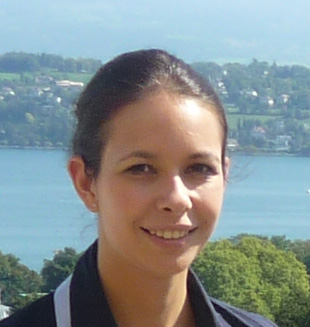In a speech to the 19th session of the UN Human Rights Council on 1 March 2012, IHEU representative Hannah Bock called for the UN to improve its communications to give greater access to the disabled. Speaking in French, Hannah cited the case of Austria where the parliament had recently accepted sign language as a means to enable deaf members to communicate, which, she said, compared favourably to the almost total lack of access afforded to the disabled at the Human Rights Council and to the UN human rights web sites.
 Ironically, and for the first time since the Council was created, the session was supported by an interpreter using sign language and instant English sub-titles to all of the screened speeches.
Ironically, and for the first time since the Council was created, the session was supported by an interpreter using sign language and instant English sub-titles to all of the screened speeches.
Much of the debate however centred on the denial of civil and political rights to people of varying levels of disability, whether blind, deaf, or suffering from psychological problems. Those considered to be mentally defective, such as persons suffering from Down’s Syndrome, were in many countries denied the right to vote.
Hannah’s speech was very well received with many delegates requesting copies. You can see her speaking, complete with English sub-titles at: http://www.youtube.com/watch?v=Cjfi8Jh0Q5E&list=UUCx-kH9VyTOP9vjt1SqHLBw&feature=plcp
Here is her statement in English, with the French version as spoken below (a German translation is available here: https://humanists.international/iheu-speaks-disabled):
Panel discussion on the rights of persons with disabilities
Thank you Madam President,
We thank the High Commissioner for the Study on the participation of persons with disabilities in political and public life. It represents for us a notable effort to enable persons with disabilities to play a full part in society.
The key to participation is two-way communication. We note that the election of a woman speaking in sign language to the Austrian National Council in 2009[1] has proved that such participation is possible in a simple way. We are pleased that sign language is recognized by the Austrian government as a distinct language.[2]
Madam President, independent access to information is essential for the political and public life of an individual.[3] The new media are particularly important in this regard. The Austrian Parliament has extended its website for partially slighted persons and offers a version in sign language with a very accessible structure.[4]
This contrasts favourably with the Internet portal of the Human Rights Council, which gives no possibility of independent access for people with disabilities. We therefore ask the Secretariat to at least add English subtitles to the videos of the Council or to create a page where transcriptions of all of the speeches would be available.
Madam President, sessions such as this on people with disabilities would be all the more effective if persons with disabilities were themselves enabled to participate. We therefore urge the Office of the High Commissioner and the Secretariat to develop a strategy to enable persons with disabilities to participate fully in the work of the Council.
Thank you, Madam.
Version francaise:
Merci, Madame la Présidente.
Nous remercions la Haut-Commissaire pour son rapport sur la participation des personnes handicapées à la vie publique et politique. Il représente pour nous un effort notable permettant aux personnes handicapées de jouer un rôle à part entière dans la société.
La clé de cette intégration est une communication mutuelle. Par exemple, l’élection d’une femme s’exprimant en langue gestuelle dans le Conseil National d’Autriche en 2009 a prouvé que cette participation était possible avec des moyens simples. Nous sommes de plus satisfaits que la langue gestuelle soit reconnue comme une langue distincte par le gouvernement autrichien.
Madame la Présidente, l’accès indépendant à l’information est essentiel pour la vie publique et politique d’un individu. Les nouveaux médias sont particulièrement importants dans ce contexte. Le Parlement autrichien a ainsi ouvert son site Internet aux malvoyants et offre une version en langue gestuelle, le tout dans une structure facilement accessible.
Ce site contraste favorablement avec le portail Internet du Conseil de droits de l’homme, qui n’offre aucune possibilité d’accès aux personnes handicapées. Nous demandons donc au Secrétariat d’ajouter au moins des sous-titres en anglais dans les vidéos du Conseil ou de créer une page où les transcriptions de tous les discours seraient disponibles.
Madame la Présidente, les sessions telles que celle-ci sur les personnes handicapées ne peuvent être que plus efficaces si les handicapés eux-mêmes peuvent y participer. Nous exhortons donc le Bureau de la Haut-Commissaire et le Secrétariat à proposer une stratégie concrète d’intégration des personnes handicapées aux débats du Conseil.
Merci madame
[1] Mag. Helene Jarmer, 10.07.2009 – à ce jour Membre de Conseil National d’ Autriche,
http://www.parlament.gv.at/WWER/PAD_57367/index.shtml, 11 February 2012
M. Plattnerp, « Politikerin mit Behinderung : Helene Jarmer » ,
http://www.myhandicap.ch/politiker-behinderung-gehoerlos-helene-jarmer.html, 11 February 2012
[2] Austrian Constitution, Article 8 (3): „Die Österreichische Gebärdensprache ist als eigenständige Sprache anerkannt. Das Nähere
bestimmen die Gesetze.“
[3] Annual report of the United Nations High Commissioner for Human Rights and reports of the Office of the High Commissioner
and the Secretary-General, “Thematic study by the Office of the United Nations High Commissioner for Human Rights on
participation in political and public life by persons with disabilities”, Page 7 – 15
[4] http://www.parlament.gv.at/PAKT/, 11 February 2012